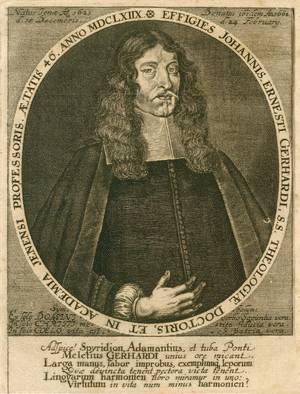Johann Ernst Gerhard and the 'Harmony' of Oriental Languages
From an early age Johann Ernst Gerhard was destined to follow in the footsteps of his deceased father, the prominent Lutheran theologian Johann Gerhard (1582-1637). Gerhard became a professor of theology at the university of Jena, where his father, and his own son after him, taught theology.
His passion, however, lay in Oriental studies. In his early twenties he had already mastered Hebrew, Chaldean (Aramaic), Syriac, Arabic, and Ge’ez, and by 1647 he had published his first major work, a polyglot grammar, taking as its base Wilhelm Schickard’s Hebrew grammar (1624), which Gerhard greatly elaborated and added in separate columns parallel grammars for Aramaic, Syriac, Arabic, and Ge’ez. To the grammatical interests of his early years were added forays into several fields of Oriental scholarship: an intensive study of the Hebrew Bible, the Syriac translation of the New Testament, occasional studies in the Quran, and in his last years a study of the history of non-Latin Churches, e.g. the Moscovite (1665), the Armenian (1665), and the Coptic Church (1666), as well as several antiquarian pursuits.
Ultimately, Gerhard failed to leave a lasting mark on his various field of study and has consequently been mostly forgotten. Like other intelligent “secondary thinkers” he offered a perceptive commentary on the scholarly and intellectual trends of his day without himself having produced a “breakthrough” which would have preserved his name for posterity. However, unlike most “secondary thinkers” Gerhard has left behind a massive library, the Gerhardina (incorporating his father’s library and his own considerable extension of it) and a remarkable collection of manuscripts, including over 1,400 letters to him, lecture notes, extensive marginalia, and unpublished miscellanea. This impressive Nachlass was purchased in the late seventeenth century by the Duke of Saxe-Gotha and has since been housed in Gotha’s historic research library. This affords us a close look at the Oriental scholarship of a seventeenth-century university professor in its intellectual, institutional, and social contexts.

The project’s aim is to offer a monographic study of Johann Ernst Gerhard as a remarkably well documented case study for this brand of Oriental studies at German universities during and in the two decades following the Thirty Years War.
The project is carried out by Dr Asaph Ben-Tov at the Forschungszentrum Gotha, University of Erfurt.